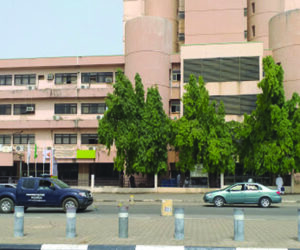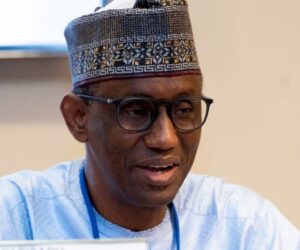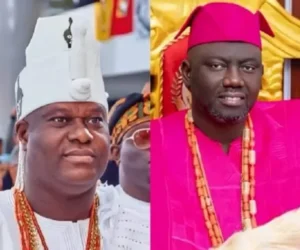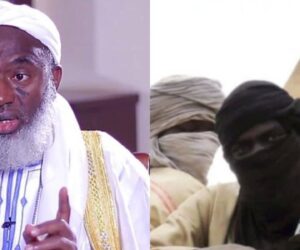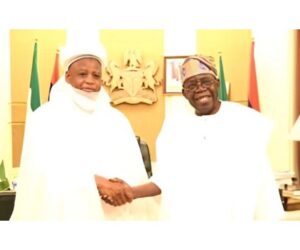Speaking on the insecurity in parts of the country and call from some quarters for the imposition of state of emergency in affected areas, Major General Umar Ibrahim Mohammed (rtd), said a whole lot needs to be done to address the problem. Speaking on a Trust Television programme, Daily Politics, Gen. Mohammed, who worked in several battalions and formations, and different hostile environments, including serving as the Garrison Commander in Plateau State, said a state of emergency could reduce the problem but government must do more than that.
First and foremost, your two cents on what a state of emergency can or cannot do in providing Nigeria with a solution to this over-a-decade-long battle with insecurity.
SPONSOR AD
A state of emergency is a proclamation that gives the government sweeping powers to restore peace and order, restore normalcy and address a crisis. It is enshrined in the 1999 Constitution, Section 305, which gives the president the power to declare a state of emergency. Conditions that may justify it include war, invasion, a breakdown in law and order, actions likely to result in disintegration of the country, or a monumental natural disaster. A state governor can also request the federal government to impose a state of emergency.
Once the president imposes it, he must transmit the proclamation to the National Assembly. If the National Assembly is in session, they have two days to deliberate and approve or reject it; if not in session, they have ten days. If after ten days it has not been approved, it becomes null and void.
If a state of emergency is declared, you can expect restrictions of movement, suspension of some constitutional rights and liberties, orders to vacate areas for operations, cordon-and-search operations, and massive deployment of military personnel and equipment. There will also be political and economic dimensions, especially faster approval of funds.
A state of emergency is usually for an initial period of six months. After that, to continue it, you must issue another proclamation. The president can end it before six months and the National Assembly can end it with a two-thirds majority. But we should not think that declaring a state of emergency will make Boko Haram, banditry, kidnapping and other crimes disappear. It can enable more to be achieved if it is backed by genuine action: the government must provide required equipment and funding.
In today’s Nigeria, do you think that is what is needed?
It is an option. When a state of emergency was declared in three North East states in the past, insecurity reduced but was not solved. There are many other problems that need addressing. One is proliferation of small arms and light weapons; there are millions and no one can explain exactly how many. Our borders are porous: Nigeria is 923,768 square kilometres with long land borders and 852 kilometres of coastline — about 4,047 kilometres of borders in total. Weapons come in through the sea and bush daily. If you declare a state of emergency and do not secure the borders, you will be limited in effect.
We need science and technology at the borders and committed staff to prevent weapons inflow. We must also address poverty, which is an enabler of insecurity. Government, businesses and well-to-do individuals should invest in human capital and skills to get miscreants off the streets and reduce the pool of people who can be drawn into criminality, insurgency and kidnapping.
As someone trained in warfare, you see over 30 theatres of operation now. Some say this is like a state of emergency by iteration because it’s unusual to have so many theatres. What do you think?
It is true we have many ongoing operations, some without closure. I have advocated concentrating efforts and finishing them before moving to others — phase the operations. For example, keep forces in other places but concentrate in the North East, finish it, then phase to the North West. Currently, deployments are piecemeal; we must concentrate and carry out focused operations. If that cannot be done, the alternative is massive recruitment and training, and government should acquire enough weapons so the military can be at strength everywhere.
Take us through the states of emergency imposed in Nigeria…
There was one in 1962, in the western region after a political crisis. In 2004, there was the Plateau crisis. In 2011, there were partial emergencies in parts of Plateau, Borno, Niger and Yobe related to Boko Haram. The big one was in 2013 in Adamawa, Borno and Yobe, which kept political leadership in place while military operations brought some calm. The recent one in Rivers was largely political but less aggressive than previous ones.
You say it is a solution, but not the solution. How can this administration boost public confidence, especially with peace deals in parts of the North West?
The government needs to do more. Minimal improvements are not enough. The government can consider imposing a state of emergency in some states, but that alone will not end it. Regarding agreements with bandits: you don’t negotiate from a position of weakness and you don’t allow them to keep their weapons. If the government wants to negotiate, the armed forces must be able to use lethal force to subdue them and force them to the table. It makes no sense to sign agreements and let them leave with weapons; there must be disarmament.
How do you compare this to the Niger Delta amnesty under the Umaru Yar’adua administration?
The Niger Delta amnesty worked because they submitted their weapons and the government gave them alternatives. The armed forces are taught to pursue disarmament, demobilisation and reintegration — a DDR program. In the North and West we should subdue bandits, force them to the table, disarm and demobilise them, then reintegrate them through retraining, reskilling and reorientation. If you take their weapons you must provide them means of livelihood. For example, provide cattle for those interested in cattle rearing, startup capital, hospitals, schools — ways for them to earn a living. Many are earning their living by killing or kidnapping; removing their weapons removes that means. When you take the weapons, you must provide alternatives so they can feed themselves.
If you give them money once it’s finished, what happens? They will still come back. So, the only thing we should do is handle it the way they did during the amnesty. During that time, all those involved in militancy in the South-South were invited.
The government sat with them, conditions were clearly stated, and the government kept its promise. Many of them were even sent abroad to learn new skills and study in universities as part of the amnesty programme.
But considering that we’re talking about this from two different positions — the government’s and the councils’ — these peace deals, especially the ones in Katsina, are being negotiated by local council administrations across over ten local governments. The state government officially says it is not negotiating peace with bandits, while the federal government has kept silent.
Do you think that by allowing these peace deals to happen this way, the government is sending the wrong message to criminals?
It looks like they are winning because everything is done on their own terms. You can see the confidence in how they talk. I watched one of them saying, “From today, nothing will happen to anybody.” That means they see themselves as lords, and that shouldn’t be the case.
Only security agencies should have the monopoly of violence. These people are armed and not entitled to be. The government must act fast and decisively.
In your years in service, did you ever seen anything like this? Especially when you see some of your comrades in those videos — armed soldiers standing beside armed bandits during peace talks?
As a retired general who served in the army for 35 years, I have great respect for the institution that made me who I am. I know the sacrifices the army has made to keep Nigeria together. I’m not happy with what I’m seeing.
I urge the military high command to look into it. I understand the desire for peace and quick results, but as soldiers, we are trained to use force. I believe we should use force first — subdue them, bring them to the negotiation table, and then disarm them.
I am not in favour of the current approach. It’s the wrong one. The best way is to subdue, negotiate, and disarm. Even if local councils are involved, that’s the way to go.
There’s this philosophy of using the carrot and stick — the kinetic and non-kinetic approach. Some pushbacks from recent attacks in Kwara, Kogi, and parts of Kebbi show that the armed forces are still capable. Some operations have been successful in the North East. But how much of the “stick” should we use?
Every war ends on a negotiating table. Whoever fights wants to end it because war is terrible. But the way I see things now isn’t encouraging.
Yes, there have been successes in some areas, but I want us to see success everywhere — even in Katsina. The Nigerian Army I served in has the capacity, equipment, training, and courage to subdue the bandits.
In internal security, one of our guiding principles is the use of “maximum minimum force.” But this is beyond that — it’s an all-out war. Many of these bandits aim to sabotage and embarrass the government and the security forces. So we must be firm.
You’ve used the word “war” many times. Is that how you would describe what we’re facing?
When I say war, I mean an imposition of will. But technically, we are not fighting a declared war. Even General Irabor once called for the army to declare war, but people must understand that declaring war is different from declaring a state of emergency. Declaring war means mobilising the entire components of national power — military, diplomatic, economic, and political — towards one purpose.
Are we not already doing that indirectly?
No, we’re not. No Nigerian government since the civil war has formally declared war. If you declare war, it means the whole budget and all national resources will be channelled towards fighting it.
But this is asymmetric warfare, not conventional.
Exactly. That’s why I say what we need now is not war but a state of emergency. War is much bigger. Declaring it means stopping other government functions — even the Minister of Works would have to focus on supporting the war effort.
When you listen to the NSA or military leaders, they often sound optimistic — but the reality in communities under attack is different. How do you explain this disconnect between what leaders say and what citizens experience?
I agree — there is a disconnect. Those who feel the pain know it. I’ve met victims of kidnappings and insurgent attacks, and I know what they go through.
Government has access to information we may not have, but there are impediments that limit their performance. As General Irabor once said, the main issue is political will. When I was in service, we believed that if there was real political will, the crisis would end.
But our defence budget has quadrupled. Isn’t that a show of political will?
People don’t realise how expensive defence procurement is. I was in Army Headquarters for ten years — the apex of the system. Nothing drains funds like military equipment.
For example, a T-90 tank costs around $9 million. And throughout my 35 years in the armoured corps, I used the same tank until just before retirement when new ones arrived. In most countries, they buy new equipment every year. We don’t.
When President Buhari approved $1 billion for arms procurement, $500 million went to the Air Force for 12 Super Tucano jets, and the remaining $500 million was shared between the Army and Navy. The Army got around $350 million — and that amount had to be split among infantry, armour, artillery, engineers, and others. It’s not enough. To fix this, we must buy massive equipment and recruit more troops.
You think the Army is small?
Yes. People think we’re one of the biggest armies in Africa. We’re not. We’re one of the strongest, not the biggest. Egypt has around 500,000 troops. Ours is far less.
But the army outnumbers the bandits and insurgents…
Yes, we outnumber them and dominate the air — they have no air power. What we lack is the consistent political will to fund and sustain operations. If the government truly wants it to end, it will.
So what exactly do you mean by political will?
It means giving direct orders and providing the necessary resources. When government orders the military to “do this,” the forces will ask for funds, equipment, fuel, and logistics. Moving 5,000 troops costs a lot — feeding, fuelling, arming. Without proper funding, you can’t sustain it. The government is trying, but there’s still a wide gap. Ammunition, vehicles, logistics — all short. War is very expensive. Feeding 30,000 troops at ₦3,000 a day, plus allowances and fuel, is a huge daily cost.
But isn’t that worth it if it brings peace?
I agree it’s worth it. But only the political leaders can explain their choices. They’re dealing with multiple challenges — roads, electricity, education, and security all at once. Government has tried, but there’s still room for improvement, especially in equipment and logistics.
Final word for Nigerians…
I urge Nigerians to be patient, pray for the armed forces, and share information with them. We must keep speaking up to encourage them. They’re doing well, but there’s still a gap. I believe very soon they will overcome these security challenges.


